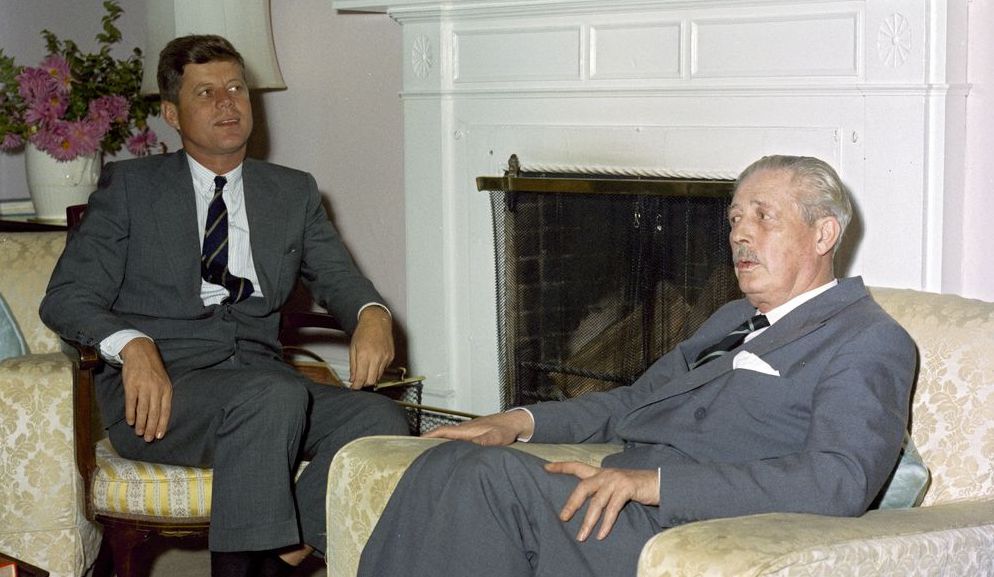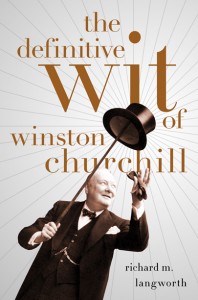
“Jaw to Jaw” Versus “Jaw-Jaw”: Supermac Still Owns the Latter
“Jaw-Jaw” be-jaws the dialogue (from 2008):
On 27 June 1954, Churchill was quoted as saying “jaw-jaw is always better than to war-war.” (William H. Lawrence, “Churchill urges Patience in Coping with Red Dangers,” The New York Times, page 1; and Walter Trohan, “‘Vigilance and Time’ Asked by Churchill,” Chicago Daily Tribune, page 1. Did Churchill say this? —M.D.
 No. From my Definitive Wit of Winston Churchill, page 37:
No. From my Definitive Wit of Winston Churchill, page 37:
“Meeting jaw to jaw is better than war.” —1954 Commonly misquoted as ‘Jaw-jaw is better than war-war,’ an expression coined four years later by Prime Minister Harold Macmillan, on a visit to Australia.
I verified this from Sir Martin Gilbert who referred to his official biography, Volume 8, Never Despair, (Hillsdale College Press, 2013), page 1004: “Churchill then told the American legislators…that conferences of this kind were vitally important, that meeting jaw to jaw is better than war.”*
* footnote 1: “On 30 January 1958 Harold Macmillan, speaking in Canberra, echoed Churchill’s words with the phrase (frequently but wrongly attributed to Churchill himself), ‘Jaw-jaw is better than war-war.’” Also page 1005 footnote 1: “’Notes on remarks by the President and the Prime Minister at the Congressional Luncheon at the White House, Saturday afternoon, June 26, 1954’: Eisenhower papers.”
Several newspaper accounts appeared at the time, quoting Churchill as saying “jaw-jaw…” etc.. Clearly, the newspapers inaccurately quoted Churchill before Macmillan used the phrase “jaw-jaw” (which may explain where Macmillan picked it up).
The Lawrence report again (2021):
The jaw-jaw business continues to resurface. Another reader writes:
William H. Lawrence was not a cub journalist, but The New York Times Senior Washington Correspondent when he wrote the subhead the day after WSC’s meeting with Congress: “Jaw-jaw is better than war-war.” He went on, quoting congressional sources: “Turning to the Far East the Prime Minister volunteered that he was a strong supporter of ‘peaceful co-existence with China.’ ‘I know” he said, “that some think this is almost heresy. Nevertheless Eden’s two words are pretty good words—to jaw-jaw is always better than to war-war.”Other newspapers reported somewhat differently but Lawrence had the stature of reliable sources to get this quote in its richness from the “no press” meeting. It wasn’t just the front page subhead but the detailed follow-on that lends credibility.Now compare this detail to your recitation and acceptance of Gilbert’s contrary quotation—almost a throwaway line. Did he get it from a copy of speech notes that might have been changed— did he hear it— did someone tell him? We don’t know because he cited no source. Even Gilbert is challengeable, given a detailed quote from a respected senior journalist—versus his unattributed throwaway line. Macmillan’s use of the quote attributing it to WSC later reinforces it. He certainly had time to verify it before using it, rather than simply taking it from a newspaper headline.
Either not verbatim, nor not 1954:
This argument is unpersuasive and doesn’t challenge Martin Gilbert’s conclusions. 1) Lawrence has Churchill referring to “Eden’s two words,” but so far as we know, Anthony Eden never voiced them. 2) Sir Martin did offer a source (Official Biography VIII, 1004.): “Notes on remarks by the President and the Prime Minister at the Congressional Luncheon at the White House, Saturday afternoon, June 26, 1954, Eisenhower Papers.” 3) Stature as a journalist doesn’t preclude someone from making a mistake. 4) Even if Lawrence was reporting what he thought Churchill said, that is not dispositive. A transcript or official summary, such as the Eisenhower Papers, is not a “throwaway line.”






